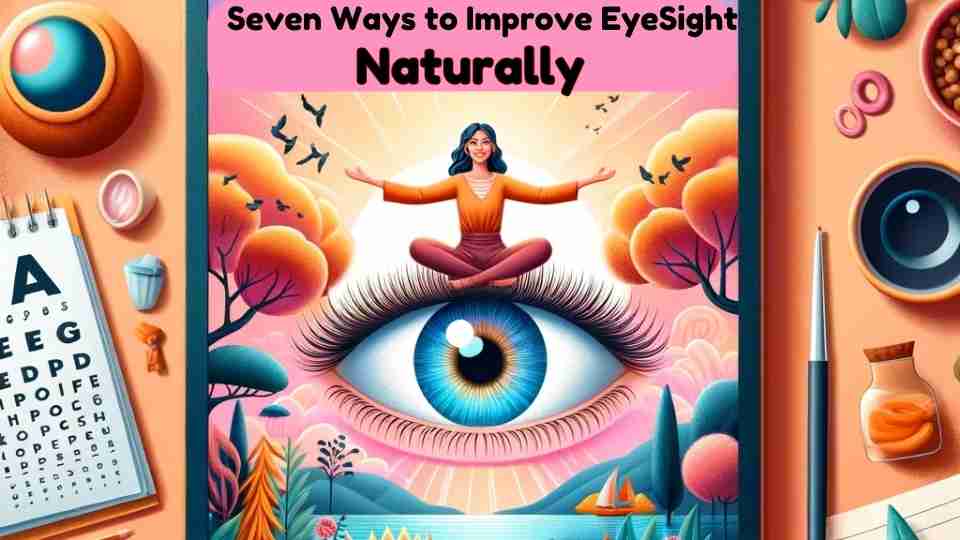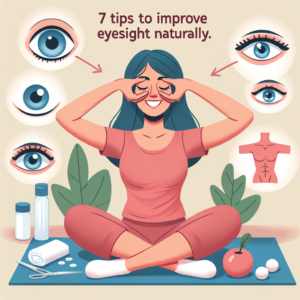
“Clear Vision, Brighter Life: ”
Date: January 14, 2024
In today’s digital age, maintaining good eyesight is crucial for our overall well-being. As a Women Happiness Coach, I understand the significance of clear vision in enhancing the quality of life. Here are 7 practical tips to naturally improve eyesight and promote optimal eye health:
- Nutrient-Rich Diet: Fuel your eyes with nutrients like vitamin A, C, and E, as well as minerals like zinc. Incorporate leafy greens, colorful fruits, and omega-3-rich foods into your diet to support eye health.
- Hydration is Key: Stay well-hydrated to ensure your eyes stay moisturized. Adequate water intake helps prevent dry eyes and maintains the natural lubrication necessary for clear vision.
- Follow the 20-20-20 Rule: Give your eyes a break from screen time. Every 20 minutes, look at something 20 feet away for at least 20 seconds. This simple practice helps reduce eye strain caused by prolonged screen exposure.
- Eye Exercises: Incorporate eye exercises into your daily routine to strengthen eye muscles. Simple exercises like focusing on near and far objects or rotating your eyes clockwise and anti-clockwise can contribute to better vision.
- Protect Your Eyes from UV Rays: Wear sunglasses that block harmful UV rays when exposed to sunlight. Prolonged exposure to UV rays can contribute to eye damage, so ensure your eyes are adequately protected.
- Adequate Sleep: Prioritize quality sleep to allow your eyes to rest and rejuvenate. Lack of sleep can lead to eye fatigue and strain, affecting your overall vision.
- Mindful Relaxation Techniques: Practice mindfulness and relaxation techniques to reduce overall stress levels. High stress can contribute to eye strain, so finding moments of calmness positively impacts your eye health.
Remember, improving eyesight is a gradual process, and consistency is key.
As you embark on this journey to better vision, also consider joining my free course on Happiness
For free access to course click HERE: Women Happiness Mantra,
& explore holistic well-being.
Additionally, don’t miss out on valuable insights in my free masterclass,
For a free Masterclass: Click the Link Here.
7 Tips to Improve Eyesight Naturally with a Nutrient-Rich Diet
- Vitamin-Rich Foods: Ensure your diet includes foods rich in vitamins A, C, and E. These vitamins are known to contribute to eye health by protecting against oxidative stress. Incorporate carrots, sweet potatoes, citrus fruits, and nuts into your meals.
- Leafy Greens: Leafy green vegetables are a powerhouse of nutrients beneficial for your eyes. Spinach, kale, and collard greens contain lutein and zeaxanthin, which can help prevent age-related macular degeneration (AMD) and cataracts.
- Colorful Fruits: Consume a variety of colorful fruits such as berries, oranges, and grapes. These fruits are rich in antioxidants that play a role in protecting your eyes from damage caused by free radicals.
- Omega-3-Rich Foods: Include omega-3 fatty acids in your diet, as they are known to support eye health. Fatty fish like salmon, chia seeds, and walnuts are excellent sources of omega-3s, which contribute to the maintenance of healthy retinas.
- Zinc-Containing Foods: Zinc is a mineral that plays a crucial role in maintaining the health of your eyes. Foods like lean meats, legumes, and seeds are good sources of zinc and can contribute to preventing age-related vision loss.
- Stay Hydrated: Proper hydration is essential for overall health, including eye health. Drinking an adequate amount of water helps maintain the moisture level in your eyes, reducing the risk of dry eyes and discomfort.
- Limit Processed Foods: Minimize the intake of processed and sugary foods, as they may contribute to inflammation and negatively impact eye health. Opt for whole, nutrient-dense foods for better overall well-being.
By incorporating these tips into your daily life, you can naturally enhance your eyesight and promote long-term eye health. Remember, a balanced diet not only benefits your eyes but contributes to your overall vitality.
7 Tips to Improve Eyesight Naturally with Eye Exercises
In addition to maintaining a nutrient-rich diet, incorporating eye exercises into your daily routine can significantly contribute to strengthening eye muscles and enhancing your vision. Here’s an in-depth look at the importance of eye exercises and some simple techniques you can integrate into your routine:

1. Focusing on Near and Far Objects: Practice focusing on objects at varying distances—both near and far. This exercise helps your eyes adjust and strengthens the eye muscles responsible for clear vision.
2. Rotating Your Eyes Clockwise and Anti-Clockwise: Perform gentle eye rotations in a clockwise and anti-clockwise direction. This exercise helps improve flexibility and agility in your eye muscles, promoting better eye movement.
3. Palming Technique: Take a break from screen time and practice the palming technique. Rub your palms together to generate warmth and gently cup them over your closed eyes. This relaxation exercise can alleviate eye strain and soothe tired eyes.
4. Blinking Exercises: Blinking is a natural way to moisten the eyes and reduce dryness. Incorporate blinking exercises by intentionally blinking for a few seconds to refresh your eyes. This simple action helps maintain proper eye moisture.
5. Figure Eight Exercise: Imagine a giant figure eight in front of you. Trace the figure eight with your eyes, focusing on smooth and controlled movements. This exercise enhances eye coordination and flexibility.
6. Up and Down / Side to Side Movements: Move your eyes in an up-and-down and side-to-side motion. This helps engage different eye muscles, promoting a wider range of motion and contributing to better eye fitness.
7. 20-20-20 Rule: Follow the 20-20-20 rule during prolonged screen use. Every 20 minutes, take a 20-second break, and focus on something 20 feet away. This practice helps reduce eye strain associated with digital devices.
By consistently incorporating these eye exercises into your daily routine, you can proactively work towards improving your eyesight naturally. Strengthening eye muscles through targeted exercises contributes to overall eye health and may enhance your visual acuity.
As you embark on this journey to better vision, also consider joining my free course on Happiness
For free access to course click HERE: Women Happiness Mantra,
& explore holistic well-being.
Additionally, don’t miss out on valuable insights in my free masterclass,
For a free Masterclass: Click the Link Here.
Frequently Asked Questions (FAQs) with answers on the topic “7 Tips to Improve Eyesight Naturally
- Q: What are the key benefits of improving eyesight naturally? A: Natural methods can enhance vision clarity, reduce eye strain, and support overall eye health.
- Q: How often should I perform eye exercises for better eyesight? A: Incorporate eye exercises into your daily routine, ideally a few times a day for short sessions.
- Q: Can a nutrient-rich diet significantly improve eyesight? A: Yes, nutrients like vitamin A, C, E, and zinc found in leafy greens and colorful fruits contribute to better eye health.
- Q: Are there specific foods that boost eye health? A: Yes, foods rich in omega-3 fatty acids, such as fish, can positively impact eye health.
- Q: What role does vitamin A play in eye health? A: Vitamin A is essential for maintaining a healthy retina and supporting low-light and color vision.
- Q: How can eye exercises strengthen eye muscles? A: Focusing on near and far objects or rotating your eyes clockwise and anti-clockwise are simple exercises that help strengthen eye muscles.
- Q: Can improved posture contribute to better eyesight? A: Yes, maintaining good posture reduces strain on the eyes, promoting overall eye health.
- Q: Is it advisable to take breaks from screen time for better eyesight? A: Yes, taking regular breaks reduces eye strain associated with prolonged screen use.
- Q: Can sunlight exposure benefit eyesight? A: Limited exposure to natural sunlight supports the production of vitamin D, crucial for eye health.
-
Q: Are there specific eye exercises for reducing digital eye strain? A: Yes, exercises like the 20-20-20 rule (looking at something 20 feet away every 20 minutes for 20 seconds) help combat digital eye strain.
- Q: How can proper hydration impact eye health? A: Staying hydrated supports overall health, including eye moisture and lubrication.
- Q: Are there specific herbs that promote eye health? A: Yes, herbs like bilberry and saffron are believed to have beneficial effects on vision.
- Q: Can eye massages help in improving eyesight? A: Gentle eye massages can improve blood circulation and alleviate eye fatigue.
- Q: How does maintaining a healthy weight contribute to better eyesight? A: A healthy weight reduces the risk of conditions like diabetes, which can affect eyesight.
- Q: Can practicing mindfulness techniques benefit eye health? A: Mindfulness techniques reduce stress, positively impacting overall eye health.
- Q: Is it possible to improve eyesight naturally as we age? A: Yes, adopting healthy habits can contribute to maintaining good eyesight as you age.
- Q: Can certain eye exercises improve peripheral vision? A: Yes, exercises focusing on peripheral awareness can enhance this aspect of vision.
- Q: How does the 20-20-20 rule help with eye strain? A: This rule prevents eye strain by giving your eyes regular breaks from screen time.
- Q: Are there specific yoga poses beneficial for eyesight improvement? A: Yes, yoga poses like palming and eye rotations can contribute to better eyesight.
- Q: Can quitting smoking improve eye health? A: Yes, quitting smoking reduces the risk of eye conditions associated with tobacco use.
- Q: How does the Mediterranean diet impact eye health? A: The Mediterranean diet, rich in fruits, vegetables, and fish, supports overall eye health.
- Q: Can allergies affect eyesight, and how can they be managed? A: Allergies can impact eyesight; managing them involves avoiding triggers and using appropriate medications.
- Q: Are there specific nutrients that benefit the macula? A: Nutrients like lutein and zeaxanthin are beneficial for macular health.
-
Q: How does the Bates Method contribute to better eyesight? A: The Bates Method involves relaxation techniques and exercises to reduce eye strain.
- Q: Can eye exercises help in reducing astigmatism? A: While eye exercises may not eliminate astigmatism, they can help alleviate associated symptoms.
- Q: How can adequate sleep positively impact eyesight? A: Quality sleep supports overall health, including eye health and reduced eye strain.
- Q: Are there specific acupressure points for eye health? A: Yes, acupressure points around the eyes can be gently massaged to promote eye relaxation.
- Q: Can practicing good hygiene prevent eye infections? A: Yes, maintaining cleanliness and avoiding touching the eyes can prevent infections.
- Q: How can antioxidants benefit eye health? A: Antioxidants protect the eyes from oxidative stress, supporting long-term eye health.
- Q: Can blue light filters on screens contribute to better eyesight? A: Blue light filters reduce exposure to harmful blue light, potentially decreasing eye strain.
- Q: How does the use of artificial tears contribute to eye health? A: Artificial tears can provide lubrication and relieve dry eyes, supporting overall eye comfort.
- Q: Are there specific vitamins for improving night vision? A: Vitamin A is crucial for night vision; ensuring an adequate intake supports this aspect of eyesight.
- Q: Can posture exercises positively impact eye health? A: Yes, exercises promoting good posture can alleviate tension and strain on the eyes.
- Q: Is there a correlation between hydration and reducing eye floaters? A: Staying hydrated may contribute to maintaining the vitreous fluid’s consistency, potentially reducing floaters.
- Q: Can outdoor activities like hiking contribute to better eyesight? A: Outdoor activities promote overall health, including eye health, through exposure to natural light and fresh air.
- Q: How can cognitive activities like puzzles benefit eyesight? A: Cognitive activities stimulate the brain and may indirectly contribute to better eyesight.
- Q: Is it possible to reverse nearsightedness naturally? A: While natural methods may not reverse nearsightedness, they can help manage symptoms and maintain eye health.
-
Q: Can maintaining a proper distance from screens prevent eye strain? A: Keeping a reasonable distance from screens reduces eye strain and supports overall eye health.
- Q: How does the use of warm compresses benefit dry eyes? A: Warm compresses can improve meibomian gland function, alleviating dry eye symptoms.
- Q: Can cognitive-behavioral techniques reduce eye strain from digital devices? A: Cognitive-behavioral techniques can help manage stress and reduce eye strain associated with digital device use.
- Q: Are there specific foods to avoid for better eyesight? A: Limiting excessive intake of processed foods and sugars can positively impact eye health.
- Q: Can meditation contribute to better eyesight? A: Meditation reduces stress, which can positively affect overall eye health.
- Q: How can a balanced lifestyle contribute to better eyesight? A: Balancing work, leisure, and self-care activities supports overall well-being, including eye health.
- Q: Can screen brightness adjustments help prevent eye strain? A: Adjusting screen brightness to ambient light levels can reduce eye strain during screen use.
- Q: Is it advisable to consult an eye care professional for personalized advice on improving eyesight? A: Yes, consulting an eye care professional ensures personalized guidance based on your specific eye health needs.
7 Tips to Improve Eyesight Naturally: The Bates Method
The Bates Method is an alternative therapy aimed at improving eyesight and reducing the need for glasses or contact lenses. Developed by Dr. William Horatio Bates in the early 20th century, the method is based on the belief that many vision problems are a result of habitual strain and can be alleviated through relaxation.
Key principles of the Bates Method include:
- Palming: Covering the eyes with the palms of the hands to block out all light, promoting relaxation and reducing strain.
- Swinging: Gentle movement of the body and eyes side to side, improving peripheral vision and flexibility.
- Shifting: Shifting focus between near and distant objects to enhance flexibility and reduce fixation.
- Sun Treatment: Exposing closed eyes to natural sunlight, believed to have beneficial effects on vision.
- Visualization: Mental imagery and visualization exercises to stimulate and relax the eyes.
- Blinking: Frequent and deliberate blinking to prevent staring and maintain moisture in the eyes.
The Bates Method suggests that poor vision is often a result of tension and stress affecting the eye muscles. Advocates of the method claim that regular practice of these techniques can lead to improved eyesight and reduced reliance on corrective lenses.
It’s important to note that while some people report positive experiences with the Bates Method, its efficacy is not universally accepted within the mainstream medical community. Before attempting any vision improvement program, it’s advisable to consult with an eye care professional for personalized advice.
Related Articles:
Here’s to clear vision and a brighter, happier life!
Dr. Ritu Goyal
Gynaecologist & Leading Women Happiness Coach India 🇮🇳

